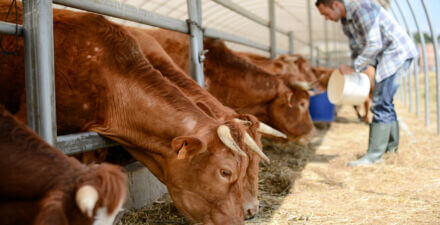What Three Reasons Explain The Changes Brought About By The Development Of Agriculture
Agriculture the Worst Fault in the History of the Human Race?: Today's Economic History
Explore Equitable Growth's current work in our Value Added blog.
Consider Jared Diamond's 1987 paean to hunter gatherers. While I detect his article provocative and insightful, I also find it annoying. Information technology seems to me that it generally misses the most of import parts of the story.
For 1 thing, it misses the importance of the ascendant Malthusian mechanisms. The invention of agriculture and the domestication of animals provide an enormous technological boost to humanity both in terms of the number of calories that can be harvested past an 60 minutes of work and in terms of the ability of a club to brand durable investments of all kinds that further boost its productivity. It is an absolute living-standard bonanza for the generations that discover it, and the generations that come after.
So what goes wrong with quality of life amongst agriculturalists? Well, without rapid technological progress and before the demographic transition, homo populations and living standards tend to settle at a indicate where, given nutrients, hazards of life, and societal institutions, every mother has on average one daughter who herself reproduces. The standard of living will be whatsoever standard of living makes that happen. And, for agriculturalists–without the hazards to adults of travel and hunting, and without the hazards a mobile lifestyle imposes on the very young–that standard of living is a lot lower than among hunter-gatherers. Lifespan looks about the aforementioned looking beyond hunter-gatherers and agriculturalists. Biomedical and fitness indicators are much much college for hunter-gatherers.
Whether this is a "disaster" or not depends on the reply to the old utilitarian puzzler of whether it is amend to have a few people who live very well or a lot of people who live very poorly. This is an open question in philosophy, just Diamond appears to recall that it is a airtight 1. And Diamond ignores the important consideration that simply the density of population that comes with agriculture can generate plenty human brains thinking to permit us to–quite perchance–transcend our Malthusian limits and create a truly man earth in the long run.
 Competitive Edge
Competitive Edge
 postal service
postal service
Every bit to inequality … violence … domination … In my view information technology is difficult to say on cyberspace. Certainly the agronomical epoch has many many more people reaping where they did not sow and gathering where they did not scatter. Nevertheless, taking all three together, I cannot guess whether there was either a positive or a negative change across the purlieus of the Neolithic Revolution. More inequality and domination, certainly. Merely you as well have many more interactions between humans that are not one-shot interactions: people take fixed addresses, after all. If nosotros know anything about humans, it is that human males have a tendency to resort to violence–maybe not as great a tendency as chimps or gorillas, just a tendency, and we make more deadly weapons. It is non at all clear to me that the hunter-gatherer epoch had less murder, rape, kidnapping and enslavement of women, and then along than did the agricultural epoch.
The hunter-gatherer historic period was not a kumbaya-singing age. Where, later all, are the Neanderthals today?
(1987): The Worst Mistake in the History of the Human being Race: Discover (May), pp. 64-66: "Archæology is demolishing another sacred belief: that human history over the by million years has been a long tale of progress…
…The adoption of agriculture, supposedly our about decisive step toward a meliorate life, was in many ways a catastrophe from which we have never recovered. With agronomics came the gross social and sexual inequality, the affliction and despotism, that curse our existence…. For most of our history we supported ourselves by hunting and gathering: we hunted wild animals and foraged for wild plants. Information technology'southward a life that philosophers have traditionally regarded every bit nasty, brutish, and short…. Our escape from this misery was facilitated but ten,000 years ago, when in different parts of the world people began to domesticate plants and animals. The agronomical revolution spread until today it's nearly universal and few tribes of hunter-gatherers survive…. Planted crops yield far more tons per acre than roots and berries. Just imagine a band of savages, wearied from searching for nuts or chasing wild animals, suddenly grazing for the first fourth dimension at a fruit-laden orchard or a pasture full of sheep. How many milliseconds do you remember it would take them to appreciate the advantages of agriculture?…. The progressivist political party line sometimes even goes and then far as to credit agriculture with the remarkable flowering of fine art…. Agronomics gave us gratis time that hunter-gatherers never had. Thus it was agriculture that enabled us to build the Parthenon and compose the B-modest Mass….
While farmers concentrate on loftier-saccharide crops like rice and potatoes, the mix of wild plants and animals in the diets of surviving hunter-gatherers provides more protein and a better balance of other nutrients…. The lives of at to the lowest degree the surviving hunter-gatherers aren't nasty and brutish, even though farmers have pushed them into some of the world's worst real estate…. The progressivist view is really making a claim about the afar past: that the lives of primitive people improved when they switched from gathering to farming. Archaeologists can date that switch by distinguishing remains of wild plants and animals from those of domesticated ones in prehistoric garbage dumps….
Usually the only human remains bachelor for report are skeletons, but they allow a surprising number of deductions…. keletons from Greece and Turkey show that the boilerplate height of hunger-gatherers toward the cease of the ice ages was a generous 5'9″ for men, 5'5″ for women. With the adoption of agriculture, elevation crashed, and by 3000 B. C. had reached a low of only five'3″ for men, v′ for women. By classical times heights were very slowly on the rise over again, merely modern Greeks and Turks have nevertheless non regained the average height of their distant ancestors…. Burying mounds in the Illinois and Ohio river valleys… a hunter-gatherer civilization gave mode to intensive maize farming around A. D. 1150…. These early farmers paid a cost for their new-establish livelihood. Compared to the hunter-gatherers who preceded them, the farmers had a nearly 50 per cent increase in enamel defects indicative of malnutrition, a fourfold increase in iron-deficiency anemia (evidenced by a bone status called porotic hyperostosis), a theefold rise in os lesions reflecting infectious disease in general, and an increase in degenerative weather of the spine, probably reflecting a lot of difficult physical labor. 'Life expectancy at birth in the pre-agricultural community was bout twenty-six years,' says Armelagos, 'but in the mail-agronomical community information technology was nineteen years. So these episodes of nutritional stress and infectious disease were seriously affecting their ability to survive.' The evidence suggests that the Indians at Dickson Mounds, similar many other primitive peoples, took up farming not past choice but from necessity in order to feed their constantly growing numbers. 'I don't remember most hunger-gatherers farmed until they had to, and when they switched to farming they traded quality for quantity,' says Mark Cohen of the State Academy of New York at Plattsburgh, co-editor with Armelagos, of one of the seminal books in the field, Paleopathology at the Origins of Agriculture. 'When I first started making that argument 10 years agone, not many people agreed with me. At present information technology's become a respectable, albeit controversial, side of the debate.'
In that location are at to the lowest degree 3 sets of reasons to explain the findings that agriculture was bad for health… a varied diet… [vs] 1 or a few starchy crops. The farmers gained cheap calories at the price of poor nutrition…. Because of dependence on a limited number of crops, farmers ran the hazard of starvation if one crop failed. Finally, the mere fact that agriculture encouraged people to clump together… led to the spread of parasites and infectious disease….
Likewise malnutrition, starvation, and epidemic diseases, farming helped bring another expletive upon humanity: deep form divisions. Hunter-gatherers have little or no stored food, and no concentrated food sources, like an orchard or a herd of cows: they live off the wild plants and animals they obtain each twenty-four hour period. Therefore, at that place can be no kings, no form of social parasites who abound fat on food seized from others. Just in a farming population could a good for you, not-producing aristocracy set itself above the disease-ridden masses. Skeletons from Greek tombs at Mycenae c. 1500 B. C. advise that royals enjoyed a ameliorate diet than commoners, since the imperial skeletons were 2 or three inches taller and had meliorate teeth (on the average, one instead of vi cavities or missing teeth). Amidst Chilean mummies from c. A. D. 1000, the elite were distinguished non only by ornaments and gold pilus clips just also by a fourfold lower rate of os lesions acquired by illness…. Farming may take encouraged inequality between the sexes, likewise. Freed from the need to ship their babies during a nomadic existence, and under force per unit area to produce more than hands to till the fields, farming women tended to have more frequent pregnancies than their hunter-gatherer counterparts — with consequent drains on their health….
Thus with the advent of agronomics and elite became ameliorate off, only most people became worse off. Instead of swallowing the progressivist party line that we chose agriculture because it was practiced for us, we must ask how nosotros got trapped by information technology despite its pitfalls. One answer boils down to the aphorism 'Might makes right.' Farming could support many more people than hunting, albeit with a poorer quality of life. (Population densities of hunter-gatherers are rarely over on person per ten foursquare miles, while farmers boilerplate 100 times that.)… As population densities of hunter-gatherers slowly rose at the cease of the ice ages, bands had to choose between feeding more mouths by taking the first steps toward agriculture, or else finding ways to limit growth. Some bands chose the former solution… outbred and and so drove off or killed the bands that chose to remain hunter-gatherers, because a hundred malnourished farmers can withal outfight one healthy hunter….
Hunter-gatherers adept the most successful and longest-lasting life style in human history. In contrast, we're still struggling with the mess into which agriculture has tumbled united states of america, and information technology'southward unclear whether we tin solve it. Suppose that an archaeologist who had visited from outer space were trying to explain human being history to his beau spacelings. He might illustrate the results of his digs by a 24-hour clock on which one hour represents 100,000 years of existent past time. If the history of the man race began at midnight, then nosotros would at present be almost at the end of our commencement day. We lived as hunter-gatherers for nearly the whole of that day, from midnight through dawn, noon, and sunset. Finally, at 11:54 p. m. we adopted agronomics. As our 2d midnight approaches, volition the plight of dearth-stricken peasants gradually spread to engulf u.s. all? Or will we somehow achieve those seductive blessings that nosotros imagine behind agriculture's glittering facade, and that take then far eluded united states of america?
Diamond is broadly right in what he says:
: Basic of Contention: The Political Economic system of Top Inequalty: "Human osteological data provide a rich, unmined source of information…
…about the distribution of nutrition, and by extension, the distribution of political power and economic wealth, in societies of long ago. On the basis of data we take collected and analyzed, we find that the shift from a hunter–gatherer to a labor-intensive agriculture opened up inequalities that had discernible furnishings on human being health and stature. But we also find that political institutions intervene decisively in affecting the distribution of resources inside societies. Political institutions appear to exist shaped not only by economic factors but also by military applied science and vulnerability to invasion, leaving important questions for additional exploration.



Equitable Recovery
The coronavirus recession and economic inequality: A roadmap to recovery and long-term structural change
Connect with us!
Explore the Equitable Growth network of experts around the country and get answers to today'south near pressing questions!
Get in Touch
Source: https://equitablegrowth.org/agriculture-the-worst-mistake-in-the-history-of-the-human-race-todays-economic-history/
Posted by: bellgunfoop.blogspot.com


0 Response to "What Three Reasons Explain The Changes Brought About By The Development Of Agriculture"
Post a Comment